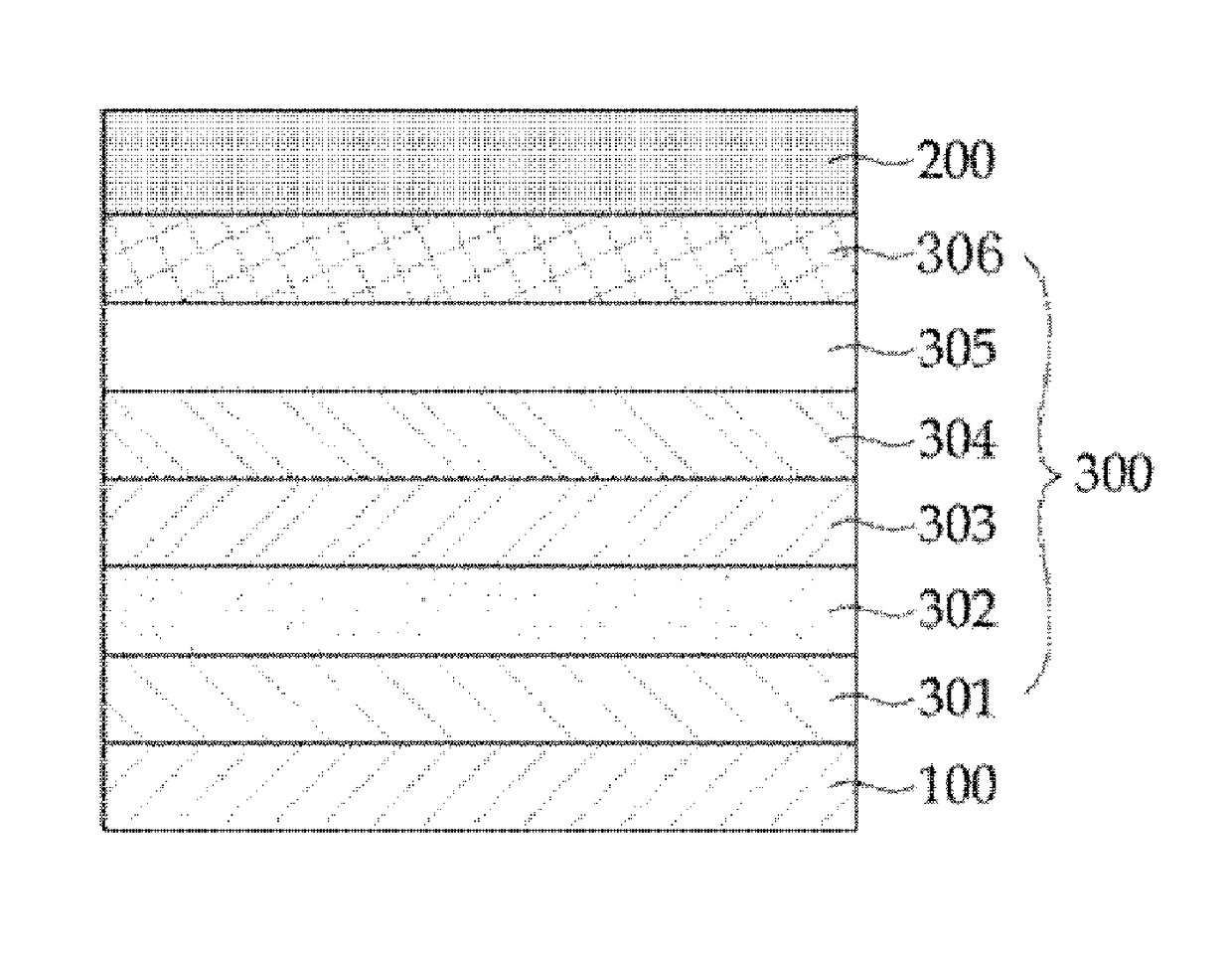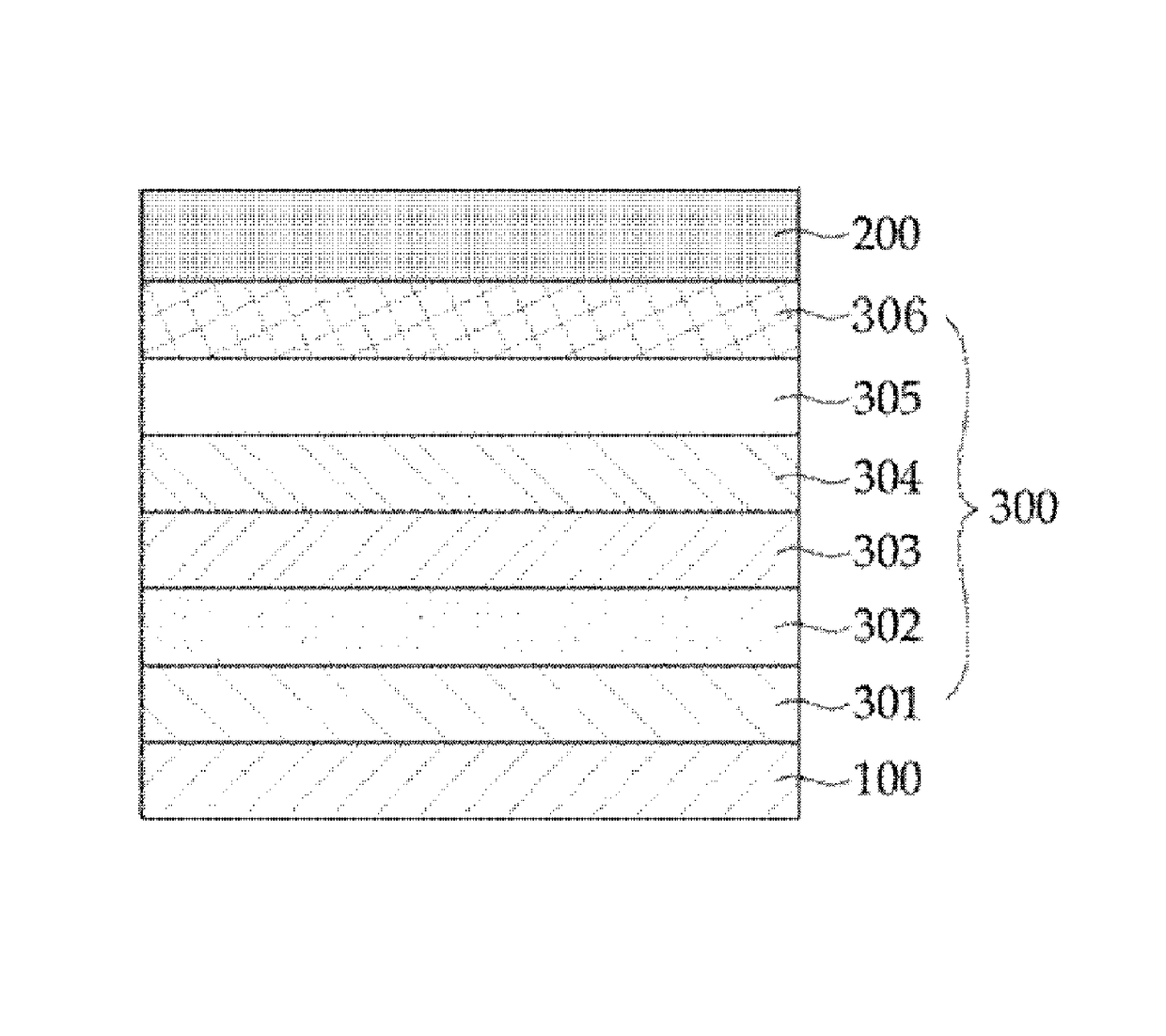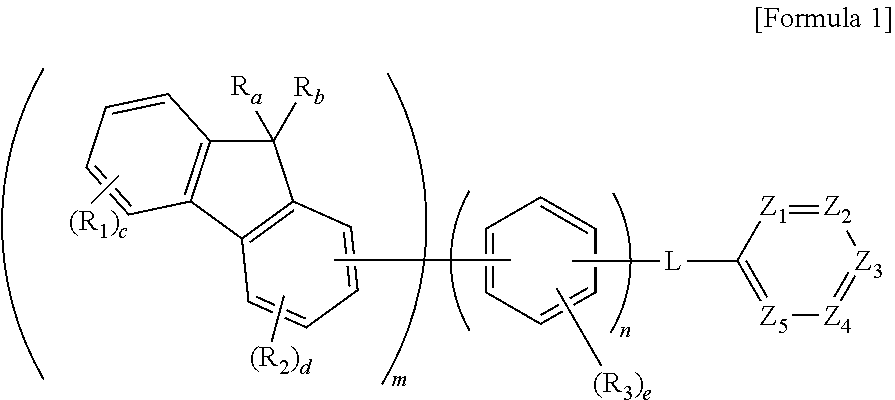Organic electroluminescent element
a technology of electroluminescent elements and organic materials, applied in organic chemistry, organic semiconductor devices, luminescent compositions, etc., can solve the problems of oxidation stability and thermal durability, failure to commercialize, and failure to meet the requirements of organic electroluminescent elements, so as to achieve the effect of reducing the cost of production, and improving the performan
- Summary
- Abstract
- Description
- Claims
- Application Information
AI Technical Summary
Benefits of technology
Problems solved by technology
Method used
Image
Examples
preparation examples 1 to 12
01 to LE-12
[0101]Compounds represented by the following LE-01 to LE-12 were prepared as bipolar compounds useful in the present invention and were measured for ΔEst, triplet energy, ionization potential, EHOMO−ELUMO, electron motility, and hole motility, using methods known in the art, and the results are summarized in Table 1, below.
[0102]
[0103]
TABLE 1Calculated(B3LYP / 6 −31G*)ΔEstMeasured(S1 −TripletIonizationEHOMO −ElectronHoleCpd.T1)energypotentialELUMOmotilitymotilityLE-0.422.785.923.496.8 × 10−47.3 × 10−501LE-0.522.685.883.457.3 × 10−45.9 × 10−502LE-0.472.715.933.568.1 × 10−47.6 × 10−503LE-0.572.736.123.446.6 × 10−45.8 × 10−504LE-0.512.815.973.637.3 × 10−48.3 × 10−505LE-0.482.836.163.646.8 × 10−47.6 × 10−506LE-0.492.825.973.607.8 × 10−48.1 × 10−507LE-0.552.805.963.587.9 × 10−37.8 × 10−508LE-0.522.826.013.627.3 × 10−47.7 × 10−509LE-0.472.725.893.458.5 × 10−47.4 × 10−510LE-0.382.655.873.416.7 × 10−46.8 × 10−511LE-0.412.716.013.517.7 × 10−47.6 × 10−512*For hole motility and electr...
examples 1 to 12
lue Fluorescent Organic Light-Emitting Element
[0104]A glass substrate coated with an ITO (indium tin oxide) thin film 1500 Å thick was cleansed by ultrasonication in distilled water and then in a solvent such as isopropyl alcohol, acetone, methanol, etc. and then dried. The glass substrate was transferred to a UV OZONE cleaner (Power sonic 405, Hwashin Tech) and cleaned for 5 min using UV, and transferred to a vacuum evaporator.
[0105]On the transparent ITO electrode (substrate) thus obtained, a hole injection layer, a hole transport layer, a light-emitting layer, a lifetime enhancement layer, an electron transport layer, an electron injection layer, and a cathode were deposited in that order to fabricate organic electroluminescent elements. Structures of the fabricated elements are as shown in Table 2, below.
[0106]
TABLE 2HoleHoleLight-LifetimeElectroninjectiontransportemittingEnhancementtransportlayerlayerlayerLayerlayerCathodeCpd.DS-205NPBAND +5% DS-LE-01 toAlq3Al(Doosan405LE-12Cor...
experimental example 1
[0112]The elements fabricated in Examples 1 to 12 and Comparative Examples 1 and 2 were measured for driving voltage at a current density of 10 mA / cm2, current efficiency, emitting peak, and lifetime (T97), and the results are summarized in Table 3, below.
[0113]
TABLE 3DrivingCurrentEmittingVolt.EfficiencyPeakLifespanCpd.(V)(cd / A)(nm)(hr, T97)ExampleLE-4.37.145863101ExampleLE-4.26.945859202ExampleLE-4.67.045762303ExampleLE-4.17.345858404ExampleLE-4.08.045841505ExampleLE-4.27.945838606ExampleLE-3.88.245842707ExampleLE-3.98.345735808ExampleLE-4.17.845839909ExampleLE-4.27.9458641010ExampleLE-4.57.0458751111ExampleLE-4.37.4457691212C.—4.75.645832Example1C.BCP5.35.945828Example2*For lifespan, a measurement was made of time taken for luminance to decrease to 97% of the initial value thereof, using a lifetime test system (McScience).
[0114]As is understood from the data of Table 3, the organic electroluminescent elements of Examples 1 to 12, each comprising a lifetime enhancement layer in ac...
PUM
| Property | Measurement | Unit |
|---|---|---|
| internal quantum efficiency | aaaaa | aaaaa |
| internal quantum efficiency | aaaaa | aaaaa |
| ionization potential | aaaaa | aaaaa |
Abstract
Description
Claims
Application Information
 Login to View More
Login to View More - R&D
- Intellectual Property
- Life Sciences
- Materials
- Tech Scout
- Unparalleled Data Quality
- Higher Quality Content
- 60% Fewer Hallucinations
Browse by: Latest US Patents, China's latest patents, Technical Efficacy Thesaurus, Application Domain, Technology Topic, Popular Technical Reports.
© 2025 PatSnap. All rights reserved.Legal|Privacy policy|Modern Slavery Act Transparency Statement|Sitemap|About US| Contact US: help@patsnap.com



